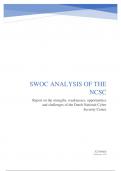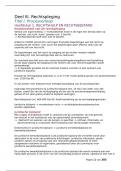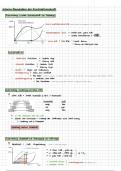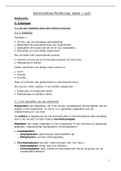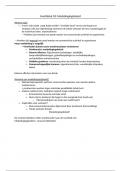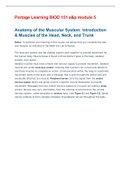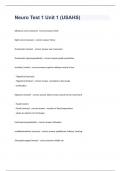The reason for the decline in witchcraft persecutions was….
o Legal system
o An increasing amount of sceptical beliefs
o Renaissance scholars
The reasons for decline of witch-hunting are always multi-causal. Although there may be
more stress on one particular factor, it cannot be down to one sole issue as to why the
hunts came to an end. Most historians such as Levack would stress importance and
emphasis on the legal system and the tightening restrictions of law and order. However,
what historians following this argument fail to recognise is other factors such as the
importance of Renaissance scholars and the increasing wave of scepticism that was
beginning to shape Europe and America. Overall though it does seem most credible to
attribute the reasons for decline (despite always being multi-causal) to most importantly
being the tightening control of law and order in society alongside the increasing scepticism
brought about through witchcraft which was catalysed by the Renaissance scholars.
Q.F: It was the tighter control and regulation of local witch trials by central of superior courts,
restoration of law and order and the tighter restriction and prohibition of torture that was the most
important reason for the decline of witch hunting.
SUPPORT: CHALLENGE:
o Tighter control and regulation of local o However, sometimes there wasn’t a
witch trials by central or superior courts. tightening of control and there were
When law and order was restored from still no large hunts. There needed to be
being corrupt, it led to a decline of witch- that strong belief in witchcraft for
hunting. This highlights how when there hunts to happen, and even in some
was a breakdown of law and order it led to places where there were control and
a rise, but when there was a restoration of regulation or a breakdown of law and
law and order it helped propel a decline of order, there were no huts due to the
hunts. lack of belief – proving beliefs were
o Tighter restriction and prohibition of somewhat more important than the
torture. Where there was high intense lawin fuelling decline.
witch hunting there had been an o However, the restriction of torture
unrestricted use of torture or an illegal use arguably slowed down the process of
of it. gaining a confession – many of the
trials rarely used torture, people
confessed because they believed in
witchcraft. Torture only used once
during the civil war and few times by
the privy council in Scotland. Proving
that it wasn’t that essential.
Synthesis:
o Tighter control and regulation of local witch trials by central or superior courts. When law
and order was restored from being corrupt, it led to a decline of witch-hunting: For example,
Northern France 1587-1588 where there was illegal use of torture including swimming
method. After this panic broke out, parliament proposed a policy in 1604 to get central
, authority at witchcraft hunts. The decline here was due to the authorities getting
centralisation over trials. Similarly in East Anglia in 1647 when law and order was restored
after the Civil War, the JPS no longer had to deal with cases and the inexperienced Earl of
Warwick. After the war, people were released who were initially brought in by Hopkins. In
Salem in 1693, once law and order had been restored after King Williams’ war there was a
general pardon in 1693 given by Phips. This allowed many who were convicted to be freed.
o Counter Argument – when there was freedom to prosecute, there wasn’t any hunts
(proving beliefs were more important): For example, in the regions of France, Portugal and
Italy, belief in the Sabbath was not widespread, and where there were strict criminal
procedures, there were decrease in executions (because of this not widespread belief).
Torture was rarely employed – in Spain it was only employed if there was strong
circumstantial evidence. The Basque hunt of 1609-11 involved thousands, but Inquisition
only tortured two of the accused. In Portugal the Portugese Inquisitors remained sceptical
regarding the reality of the sabbath & they had strict criminal procedures. In France, there
were weaknesses in the sabbath belief & strict criminal procedures especially after 1614, the
execution rate remained low.
o Tighter restriction and prohibition of torture. Where there was high intense witch hunting
there had been an unrestricted use of torture or an illegal use of it: For example, in Russia
there was an absence of judicial control over persecutions and so an unrestricted use of
torture. Similarly, in HRE, torture was used outside of the law as was in England by Hopkins.
It is likely that in Salem, torture was used on people like Tituba, and in Scotland it was only
approved by the Privy council three times (officially), but probably used much more.
MJ: The tightening and regulation of the legal system had proved to be one of the most important
factors for the reasons for the decline of witch-hunting. Although it seems plausible that scepticism
and beliefs had helped to propel decline too – this moved alongside the law and combined, helped
propel the decline.
Q.F: It was the Renaissance scholars that had helped catalyse the beliefs were beginning to decline.
Although it can’t be a direct cause for the decline of the hunts, there are some clear correlations
that affected the decline of witch-hunting in the 17th century.
SUPPORT: CHALLENGE:
o The timeline of Renaissance scholars o However, some scholars being anti-
writing correlates with the ideas that witchcraft had somewhat lead to a
authorities were generally sceptical by spike. E.g. 1584 Scot, trier 1580s,
1620s. North Berwick, Scotland in 1580s.
o The change from an empirical approach to Although there isn’t a direct
an authoritative. Using religion to explain correlation, there needs to be some
how the devil cannot be real. Heavily accreditation here.
religious society, likely to be impacted. o Despite the authorities spreading
o The Renaissance helped spread a chain information and disbelieving in
reaction of beliefs and scepticism. The witchcraft, the general population still
Renaissance and printing press (1440s) held ideas about the sabbath, devil,
helped spread information, which magic and popular cultural ideas
formulated new questions, this added new surrounding these beliefs.
twists for beliefs, then new charges o The Renaissance scholars, alone,
o Legal system
o An increasing amount of sceptical beliefs
o Renaissance scholars
The reasons for decline of witch-hunting are always multi-causal. Although there may be
more stress on one particular factor, it cannot be down to one sole issue as to why the
hunts came to an end. Most historians such as Levack would stress importance and
emphasis on the legal system and the tightening restrictions of law and order. However,
what historians following this argument fail to recognise is other factors such as the
importance of Renaissance scholars and the increasing wave of scepticism that was
beginning to shape Europe and America. Overall though it does seem most credible to
attribute the reasons for decline (despite always being multi-causal) to most importantly
being the tightening control of law and order in society alongside the increasing scepticism
brought about through witchcraft which was catalysed by the Renaissance scholars.
Q.F: It was the tighter control and regulation of local witch trials by central of superior courts,
restoration of law and order and the tighter restriction and prohibition of torture that was the most
important reason for the decline of witch hunting.
SUPPORT: CHALLENGE:
o Tighter control and regulation of local o However, sometimes there wasn’t a
witch trials by central or superior courts. tightening of control and there were
When law and order was restored from still no large hunts. There needed to be
being corrupt, it led to a decline of witch- that strong belief in witchcraft for
hunting. This highlights how when there hunts to happen, and even in some
was a breakdown of law and order it led to places where there were control and
a rise, but when there was a restoration of regulation or a breakdown of law and
law and order it helped propel a decline of order, there were no huts due to the
hunts. lack of belief – proving beliefs were
o Tighter restriction and prohibition of somewhat more important than the
torture. Where there was high intense lawin fuelling decline.
witch hunting there had been an o However, the restriction of torture
unrestricted use of torture or an illegal use arguably slowed down the process of
of it. gaining a confession – many of the
trials rarely used torture, people
confessed because they believed in
witchcraft. Torture only used once
during the civil war and few times by
the privy council in Scotland. Proving
that it wasn’t that essential.
Synthesis:
o Tighter control and regulation of local witch trials by central or superior courts. When law
and order was restored from being corrupt, it led to a decline of witch-hunting: For example,
Northern France 1587-1588 where there was illegal use of torture including swimming
method. After this panic broke out, parliament proposed a policy in 1604 to get central
, authority at witchcraft hunts. The decline here was due to the authorities getting
centralisation over trials. Similarly in East Anglia in 1647 when law and order was restored
after the Civil War, the JPS no longer had to deal with cases and the inexperienced Earl of
Warwick. After the war, people were released who were initially brought in by Hopkins. In
Salem in 1693, once law and order had been restored after King Williams’ war there was a
general pardon in 1693 given by Phips. This allowed many who were convicted to be freed.
o Counter Argument – when there was freedom to prosecute, there wasn’t any hunts
(proving beliefs were more important): For example, in the regions of France, Portugal and
Italy, belief in the Sabbath was not widespread, and where there were strict criminal
procedures, there were decrease in executions (because of this not widespread belief).
Torture was rarely employed – in Spain it was only employed if there was strong
circumstantial evidence. The Basque hunt of 1609-11 involved thousands, but Inquisition
only tortured two of the accused. In Portugal the Portugese Inquisitors remained sceptical
regarding the reality of the sabbath & they had strict criminal procedures. In France, there
were weaknesses in the sabbath belief & strict criminal procedures especially after 1614, the
execution rate remained low.
o Tighter restriction and prohibition of torture. Where there was high intense witch hunting
there had been an unrestricted use of torture or an illegal use of it: For example, in Russia
there was an absence of judicial control over persecutions and so an unrestricted use of
torture. Similarly, in HRE, torture was used outside of the law as was in England by Hopkins.
It is likely that in Salem, torture was used on people like Tituba, and in Scotland it was only
approved by the Privy council three times (officially), but probably used much more.
MJ: The tightening and regulation of the legal system had proved to be one of the most important
factors for the reasons for the decline of witch-hunting. Although it seems plausible that scepticism
and beliefs had helped to propel decline too – this moved alongside the law and combined, helped
propel the decline.
Q.F: It was the Renaissance scholars that had helped catalyse the beliefs were beginning to decline.
Although it can’t be a direct cause for the decline of the hunts, there are some clear correlations
that affected the decline of witch-hunting in the 17th century.
SUPPORT: CHALLENGE:
o The timeline of Renaissance scholars o However, some scholars being anti-
writing correlates with the ideas that witchcraft had somewhat lead to a
authorities were generally sceptical by spike. E.g. 1584 Scot, trier 1580s,
1620s. North Berwick, Scotland in 1580s.
o The change from an empirical approach to Although there isn’t a direct
an authoritative. Using religion to explain correlation, there needs to be some
how the devil cannot be real. Heavily accreditation here.
religious society, likely to be impacted. o Despite the authorities spreading
o The Renaissance helped spread a chain information and disbelieving in
reaction of beliefs and scepticism. The witchcraft, the general population still
Renaissance and printing press (1440s) held ideas about the sabbath, devil,
helped spread information, which magic and popular cultural ideas
formulated new questions, this added new surrounding these beliefs.
twists for beliefs, then new charges o The Renaissance scholars, alone,


